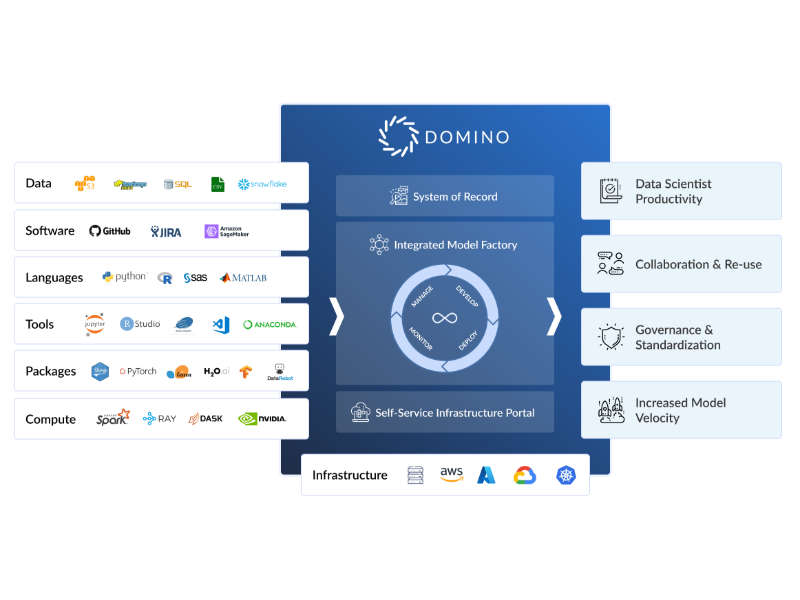- Nick Elprin is the Co-founder and CEO at Domino Data Lab.
- Elprin holds a BA and MS from Harvard College in computer science and has a strong foundation in both theoretical and applied aspects of the field.
- Domino Data Lab aims to accelerate research, speeds model deployment, and increases collaboration for code-first data science teams at scale, all in one platform.
Nick Elprin, Co-founder and CEO of Domino Data Lab, leads an enterprise MLOps platform trusted by over 20% of Fortune 100 companies. With degrees in computer science from Harvard and a background at Bridgewater Associates, Elprin focuses on accelerating data science innovation and collaboration, aiming to make Domino synonymous with data science and machine learning.
Who is Nick Elprin?
Nick Elprin serves as the Co-founder and CEO of Domino Data Lab, an enterprise MLOps platform that accelerates the process of developing and deploying machine learning models.
Nick Elprin’s journey into the world of technology and data science began early in his life. Growing up with a keen interest in computers and programming, he pursued this passion academically. “I was interested in working with software, and building software to solve interesting problems. Then it turned out that there are a lot of interesting problems around data and data science that demand help from software,” said Elprin.
I was interested in working with software, and building software to solve interesting problems. Then it turned out that there are a lot of interesting problems around data and data science that demand help from software.
Nick Elprin, CEO of Domino Data Lab
Elprin attended Harvard University, where he earned a Bachelor’s degree in Computer Science. His time at Harvard not only solidified his technical foundation but also exposed him to cutting-edge research and developments in the field. Following his undergraduate studies, Elprin furthered his education by obtaining a Master’s degree in Computer Science from Harvard University.
After completing his education, Nick Elprin began his professional career at Bridgewater Associates, one of the world’s largest hedge funds. At Bridgewater, Elprin held the role of a Senior Technologist, where he was responsible for developing and maintaining the firm’s core technologies. His work involved creating systems that could analyse vast amounts of financial data to inform investment decisions, laying the groundwork for the company’s future endeavours in data-driven decision-making.
The pivotal moment in Nick Elprin’s career came in 2013 when he co-founded Domino Data Lab alongside Chris Yang and Matthew Granade. The trio identified a significant gap in the market: while many organisations were keen to leverage data science, they often lacked the infrastructure and tools needed to do so effectively. Domino Data Lab was created to address this need by providing a platform that simplifies the development, management, and deployment of machine learning models.
Also read: Who is Liran Zvibel? CEO of WEKA was an Israeli soldier, now battles data workloads
Elprin and Domino
Nick Elprin and Chris Yang, both former employees of Bridgewater, a quantitative asset management firm heavily reliant on data and models, founded Domino after recognising the limitations of their personal growth within their roles. Working at Bridgewater provided them with invaluable insights into developing, deploying, and monitoring predictive models for critical decision-making. However, they felt their learning had plateaued and desired to make a broader impact on the world.
Their decision to launch a startup stemmed from a desire to leverage their expertise in enabling advanced quantitative research teams. Through extensive interviews with data scientists, they identified common pain points and challenges in their work, which informed the development of a product aimed at improving data science workflows.
Nick Elprin said, “We want Domino to become synonymous with the whole discipline of data science and machine learning, similar to how other legendary companies come to stand for the type of work that they support. I often talk with candidates about what Workday is to HR, what GitHub is to software engineering, and what Salesforce is to sales teams and CRM. If we do our jobs right, then in five to ten years, Domino Data Lab will be that for data science.”
We want Domino to become synonymous with the whole discipline of data science and machine learning, similar to how other legendary companies come to stand for the type of work that they support.
Nick Elprin, CEO of Domino Data Lab
They prioritise several key values in their work that have shaped the company’s ethos and trajectory. Understanding their customers and delivering what they need is at the core of Domino’s business philosophy. They emphasise the importance of rapid feedback cycles, listening to customer feedback, and continuously improving their products based on user insights. Their data-driven approach ensures that decisions are grounded in evidence and align with the needs of their customers.
Humility and low ego are fundamental values at Domino, fostering a culture of open debate and collaboration. Elprin values constructive discussion and encourage honest self-assessment, believing that iteration and self-reflection lead to innovation and growth.
Currently, Domino is focused on addressing business challenges in two main areas: product development and go-to-market strategy. On the go-to-market side, they are transitioning from individual efforts to scalable processes and systems, aiming to double the size of their sales team and implement more structured methodologies. In terms of product development, they are focused on making significant leaps in innovation to stay ahead of the market.
At Domino, personal growth is a priority, and employees are encouraged to take risks and embrace failure as part of the iterative process. The company fosters an environment where every role is essential to its success, and employees are empowered to contribute to the company’s vision and impact.
Also read: Who is Aetna Wun Trombley? CEO, board member of Lycia Therapeutics is a relentless innovator
An introduction to Domino Data Lab

Domino Data Lab offers the Enterprise MLOps platform enabling data scientists to develop better AI models faster that has earned the trust of over 20% of the Fortune 100 companies. Its products enable thousands of data scientists to develop better medicines, grow more productive crops, adapt risk models to major economic shifts, build better cars, improve customer support, or simply recommend the best purchase to make at the right time.
Data scientists are called upon to solve ever more complex problems across every facet of business and civic life. Domino empowers data science teams to develop and deploy ideas faster with collaborative, reusable reproducible analysis in a secure platform built with the needs of compliance intensive industries in mind.
“One of the things we think is really important is supporting the data scientist in the way they want to work rather than trying to change it. You see products that expect users to change the language they use or the workflow or something like that. At Domino, we really try to minimise any impact on how the data scientist wants to work. So for instance we support R, Python, Matlab, Julia, etc; and our users work in the IDEs and tools they already use, not some new editor that we’ve built.” said Elprin.
One of the things we think is really important is supporting the data scientist in the way they want to work rather than trying to change it. At Domino, we really try to minimise any impact on how the data scientist wants to work.
Nick Elprin, CEO of Domino Data Lab
People can build, deploy, and manage AI with Domino’s unified platform. They can access data, tools, compute, models, and projects across any environment, which fosters collaboration, establishes best practices, and tracks models in production to accelerate and scale AI while ensuring governance and reducing costs.
Build and deploy
On-demand infrastructure: Domino Data Lab offers a streamlined process for building and deploying data science projects. With the launch of a new workspace screen, users are greeted with a clean interface, providing instant access to on-demand infrastructure.
Explore your data: Domino’s data management and exploration capabilities empower users to securely access, explore, and transform data from anywhere. Whether in the cloud or on-premises, data engineers and scientists can cleanse, visualise, and build robust features and datasets for training predictive and generative AI models. This versatility extends to both structured and unstructured data, enabling comprehensive analysis and insights.
AI Lab: In Domino’s AI Lab, users can rapidly train, tune, and develop AI applications using code-first or low-code methods. With features for fine-tuning foundation models and optimising training through hyperparameter tuning and distributed processing, teams can efficiently manage experiments and compare models to achieve peak performance.
AI Factory: Domino’s AI Factory simplifies the deployment and management of models and applications. Users can deploy on Domino or third-party platforms, export to existing CI/CD pipelines, and even publish and host apps like R Shiny, Dash, and Streamlit. With monitoring capabilities to detect drift and automate issue resolution, organisations can ensure that AI solutions scale to meet demand while continuously improving performance.
Govern and manage
Model governance: Domino offers a comprehensive framework for developing, evaluating, and deploying trustworthy AI solutions. Domino provides enterprises with the tools to ensure accuracy, transparency, and accountability across the model lifecycle.
Cost management: Domino helps optimise and reduce IT and cloud expenses by maximising resource efficiency through smart monitoring and controls. Gain insights with granular billing reports for precise financial management. Set budget limits and automated alerts for proactive cost management.

